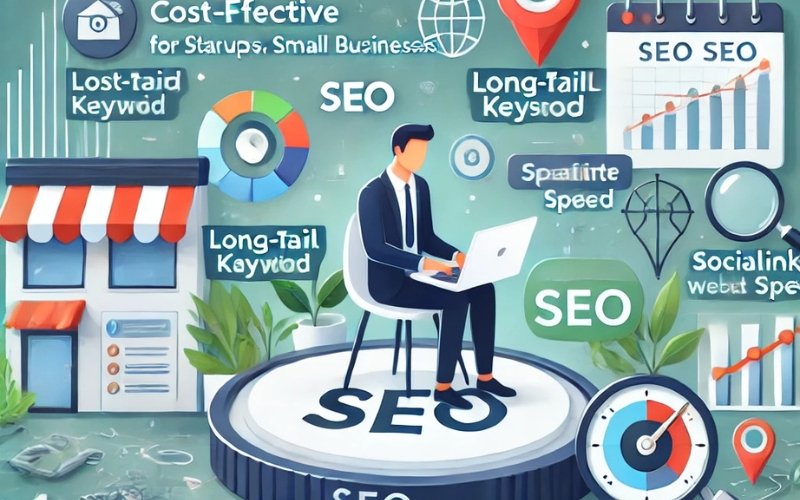Introduction: For startups and small businesses with limited budgets, implementing cost-effective SEO strategies is essential to establish an online presence and attract potential customers. While large corporations can afford comprehensive digital marketing campaigns, smaller businesses often need to get creative to achieve results without breaking the bank. The good news is that SEO offers numerous affordable strategies that can yield significant returns. In this article, we’ll explore seven cost-effective SEO strategies that can help startups and small businesses improve their search rankings and drive organic traffic.
1. Optimize for Local SEO

Local SEO is one of the most powerful and cost-effective SEO Strategies for startups and small businesses, especially those targeting a specific geographic area. By optimizing your website for local searches, you increase your chances of appearing in search results when people nearby search for services or products you offer. Google My Business (GMB) is a free tool that plays a vital role in SEO Strategies for local visibility. By claiming and optimizing your GMB profile, you can enhance your business’s visibility in local search results and Google Maps.
Additionally, ensure that your business name, address, and phone number (NAP) are consistent across all platforms, including your website, social media, and online directories. These foundational SEO Strategies can make a significant difference in your local search rankings. Encourage customers to leave reviews on Google, Yelp, and other review sites to boost your credibility and rankings, further complementing your SEO Strategies for improved results.
2. Focus on Long-Tail Keywords
While it’s tempting to target broad and competitive keywords, long-tail keywords are a vital part of effective SEO Strategies for startups and small businesses. Long-tail keywords are more specific, less competitive, and often lead to higher conversion rates, making them a crucial element in modern SEO Strategies. These phrases typically consist of three or more words and are designed to capture users who are closer to making a purchase decision.
For example, instead of targeting the highly competitive keyword “running shoes,” a small business could focus on “affordable running shoes for beginners” or “best running shoes for flat feet.” These long-tail keywords not only attract a more targeted audience but also align seamlessly with tailored SEO Strategies to improve ranking potential.
Using free tools like Google Keyword Planner, Ubersuggest, or AnswerThePublic can help you identify relevant long-tail keywords that support your overall SEO Strategies and align with your business’s products or services. Incorporating these into your content ensures that your SEO Strategies are both cost-effective and impactful.
3. Create High-Quality, Evergreen Content
Content is the backbone of SEO, and creating high-quality, evergreen content is a cost-effective strategy that can drive traffic for years to come. Evergreen content refers to articles, blogs, and guides that remain relevant over time, attracting organic traffic long after they’ve been published. This could include “how-to” guides, tutorials, and informative articles that answer common questions in your industry.
Startups and small businesses should focus on creating valuable content that addresses their audience’s pain points and provides solutions. Not only does this help improve your SEO rankings, but it also establishes your business as an authority in your niche. Since content creation doesn’t require a massive budget, investing in well-researched and engaging content can yield long-term SEO benefits without ongoing costs.
4. Improve Website Speed and Mobile-Friendliness
User experience is a critical factor that search engines consider when ranking websites, and improving your website’s speed and mobile-friendliness can significantly boost your SEO. Google prioritizes websites that load quickly and offer a seamless experience across all devices, especially mobile phones. This is crucial for small businesses, as many users access websites via mobile devices.
There are several free tools, such as Google PageSpeed Insights, that can help you assess your website’s performance and identify areas for improvement. Optimizing images, reducing file sizes, and minimizing redirects are simple steps that can improve your site’s load time. Additionally, ensuring that your website is responsive and mobile-friendly will enhance the user experience and improve your search engine rankings.
Improving these technical aspects of SEO doesn’t require a large budget, and the payoff in better rankings and user satisfaction can be substantial.
5. Leverage Social Media for SEO Benefits

While social media doesn’t directly impact your website’s search engine rankings, it can indirectly boost your SEO efforts by driving traffic to your website and improving brand visibility. Startups and small businesses can use social media platforms like Facebook, Instagram, Twitter, and LinkedIn to share their content, engage with their audience, and build a community around their brand.
By promoting your blog posts, articles, and website pages on social media, you increase the chances of attracting visitors who may share your content or link back to it, further enhancing your SEO efforts. Additionally, maintaining an active presence on social media helps build brand authority and trust, both of which contribute to long-term SEO success.
Social media platforms are free to use, making them an affordable and effective tool for boosting your SEO strategy without any direct costs.
6. Build Quality Backlinks
Backlinks, or links from other websites pointing to your site, are one of the most important factors in determining your website’s authority and search engine ranking. However, for startups and small businesses, acquiring backlinks can be challenging without a budget for paid link-building services. Instead, focus on building quality, organic backlinks through free and low-cost strategies.
Guest blogging is an excellent way to gain backlinks and exposure. By writing articles for industry-related websites, you can secure backlinks to your website while reaching a broader audience. Additionally, participating in online forums, answering questions on platforms like Quora, and engaging in niche communities can help you build relationships that result in backlinks.
It’s essential to focus on quality over quantity. A few high-quality backlinks from reputable websites can have a more significant impact on your SEO than dozens of low-quality links.
7. Monitor and Analyze Your SEO Performance

Finally, one of the most cost-effective SEO strategies for startups and small businesses is monitoring and analyzing your SEO performance regularly. By keeping track of what’s working and what’s not, you can make data-driven decisions and focus your efforts on strategies that deliver the best results.
Google Analytics and Google Search Console are free tools that provide valuable insights into your website’s traffic, rankings, and user behavior. Regularly reviewing your analytics data allows you to identify which keywords are driving traffic, which pages need improvement, and where your SEO efforts are paying off. By focusing on the areas that bring the most value, you can maximize your SEO efforts without overspending.
Understanding and adapting to the data ensures that your SEO strategy remains effective and scalable as your business grows.
Conclusion: Cost-Effective SEO Strategies for Startups
SEO doesn’t have to be expensive to be effective. For startups and small businesses, these seven cost-effective strategies offer a way to improve search engine rankings, attract organic traffic, and grow their online presence without a large marketing budget. By focusing on local SEO, long-tail keywords, quality content, technical improvements, social media, backlinks, and continuous monitoring, small businesses can build a strong SEO foundation that delivers long-term results.

